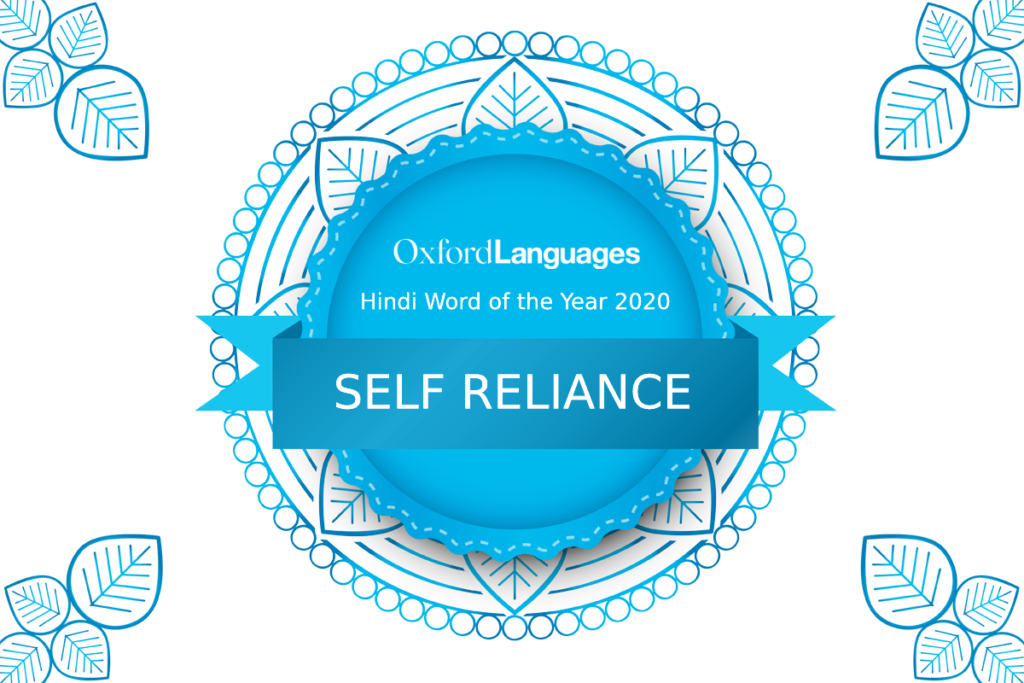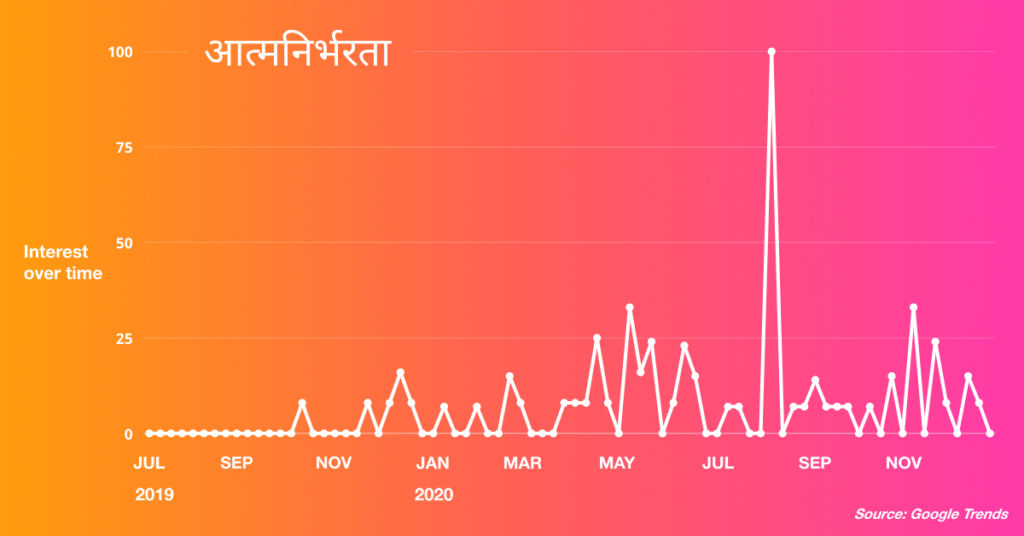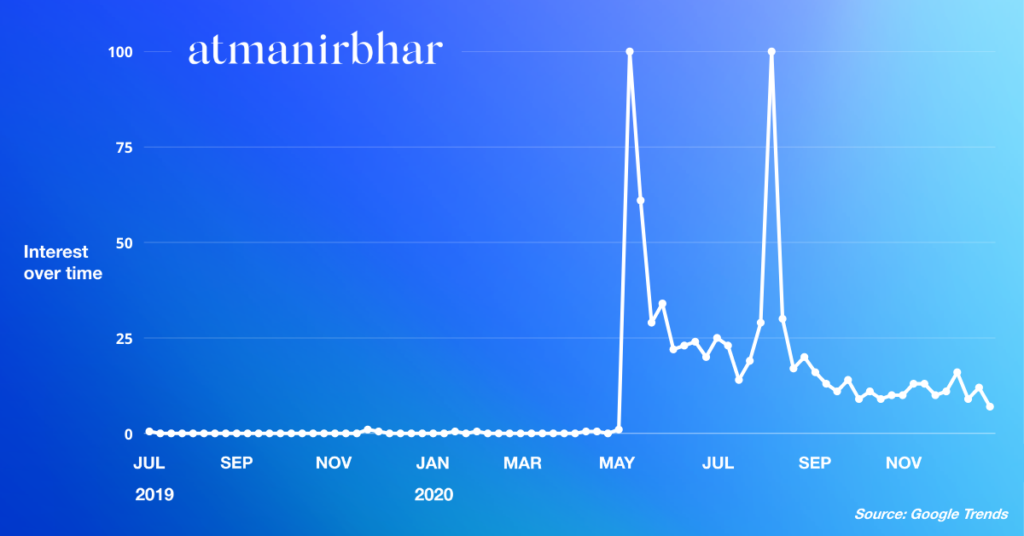Hindi Word of the Year 2020
The Oxford Hindi Word of the Year is a word or expression that is chosen to reflect the ethos, mood, or preoccupations of the passing year, and have lasting potential as a term of cultural significance.
The Oxford Hindi Word of the Year 2020 is… Aatmanirbharta or Self-Reliance.

Amidst a year of unprecedented times, of unlearning the normal, of adopting a new normal, and redefining the usual, it was the indomitable human spirit that shone through it all. For a major part of the year while India has been under stringent lockdowns involving restriction of movement and other activities, the spirit of resilience and self-reliance has helped people weather some of the toughest times. Many have found that the ray of hope in most of our lives came from within ourselves.
In an address to the nation in early May 2020, while Prime Minister Mr. Narendra Modi announced India's Covid-19 recovery package, he emphasised the need of becoming self-reliant as a country, as an economy, as a society and as individuals, in a bid to navigate the perils of a pandemic. The Prime Minister elaborated on this, noting that “Aatmanirbhar Bharat is not about being self-contained or being closed to the world, it is about being self-sustaining and self-generating. We will pursue policies that promote efficiency, equity and resilience.”
We saw a significant increase in the usage of Aatmanirbharta (self-reliance) following the Prime Minister’s address, highlighting its increased prominence as a phrase and concept in the public lexicon.


That is not to say the concept of self-reliance is new; it draws similarities with Gandhi’s vision of a self-sufficient village economy where the villages would be independent economic units. Tracing back to India’s more recent history, in the year 1965 we were led through tough times in a similar manner by then Prime Minister Mr. Lal Bahadur Shastri. Mr. Shastri was the driving force for the creation of a self-sufficient India and a self-reliant India. His policies brought in the Green Revolution and the White revolution that saw us, as a nation, through the times of war and food scarcity.
On an individual level, 2020 required self-reliance more than ever before. From home schooling to remote working, from creating our own means of entertainment to finding ways of keeping ourselves physically fit within confined spaces, from cooking for ourselves to caring for ourselves, and being forced to remain away from family and loved ones for extended periods of time, what has gotten many of us through is self-reliance. This has taken many forms, from discovering how to take care of our mental wellbeing in the absence of immediate support systems, to finding new support systems in online communities.
Hopeful stories have emerged from dark times, from examples of regular people offering food to the needy, to helping a stranded labourer reach their home , to embracing the spirit of entrepreneurship and in turn, becoming a job giver from a job seeker, and finding ways to create means of livelihood for artisans, for labourers, and for blue collar workers rendered jobless in the pandemic.
As we enter 2021, one of the standout successes of the entire Atmanirbhar Bharat campaign is the large-scale manufacturing of Covid-19 vaccine in India. During the Republic Day parade on 26th January, the Department of Biotechnology highlighted the Atmanirbhar Bharat campaign and showcased the Covid-19 vaccine development process in their tableau at Rajpath. India as well as supplying these vaccines to neighbouring countries. As a nation the country is leading by example, supplying these vaccines to neighbouring countries, and embracing the concept of self-reliance.
As they say, “change is the only constant”. This year has been about adapting, changing and growing. And also truly being Aatmanirbharta!
Kritika Agrawal
***
To select the Hindi Word of the Year, we obtained entries from Hindi speakers through Twitter. Our call for suggestions ran from December 2020 to January 2021, and was met with a very encouraging response. We received hundreds of diverse and thoughtful entries.
Together with our judging panel of Hindi language experts, we reviewed the entries we had received, analysed them, discussed them, and then took a unanimous decision.
The panelists:
Kritika Agrawal
Kritika Agrawal is an Indian Advocate-on-Record and a graduate from the University of Oxford. She enjoys a keen interest in languages (especially the lesser spoken ones with a focus on their scripts!), having learnt Tamil, Gujarati and Sanskrit as a student in Sardar Patel Vidyalaya, New Delhi. She also knows Hungarian, Hindi, Urdu, Punjabi, the ancient Brahmi script and English, and has been a recipient of prestigious scholarships for Tamil, Sanskrit and Hungarian.
Poonam Sahay
Dr. Poonam Nigam Sahay, born and educated at Delhi (Presentation Convent/Miranda House) is currently an Associate Professor in English Language, Literature & Linguistics at Ranchi University and wears many hats successfully. She is a prolific bilingual poet, writer, editor, critic, and freelancer, writing with an unparalleled passion and zeal in Hindi and English. She works with ELT/Hindi, Modern Drama and Fiction and has presented/published many research papers/poems abroad as well as inland.
Imogen Foxell
Imogen Foxell is an Executive Editor for Oxford Languages, working on languages other than English. She has been involved in several projects for Hindi and other Indian languages, in particular leading a major revision of Oxford’s English-Hindi bilingual dictionary.
Webinar: How can language data from Oxford power your business?
Oxford Languages, part of Oxford University Press, are the leading provider of lexical and language datasets for use in enhanced reading, translation, validation, prediction, display, and a wide range of language technologies. In this interactive online session our India-based team tap into this deep experience to learn more about what we can offer, and how we can enable and support your projects.
